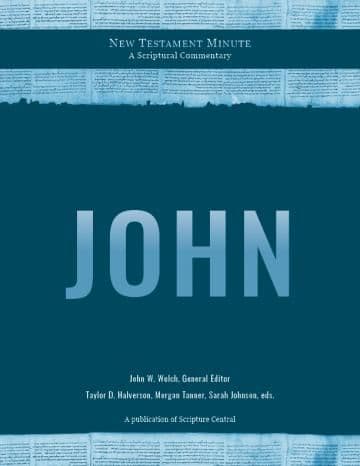Book
19 Chapters

The beginning of this chapter reinforces the idea that faith can calm a troubled heart, even in distressing circumstances. “Mansions” is translated from the Greek monē, which does not indicate a house of considerable size but rather a dwelling place more generally. It is etymologically related to the Greek menō (cognate with the English remain, thus monē is “a place to stay”). Menō plays an important role in the Gospel of John—especially in the following chapter, where it is usually rendered as “abide.” This fits a theme of the Farewell Discourse: Jesus is leaving to prepare a place where the believer can remain with Jesus and the Father in eternal communion.
Verse 6 is one of the most famous in all scripture, and for good reason. Emphasis seems to be on “the way,” as it is the answer to Thomas’s question. “The truth and the life” further explain “the way” and describe who Jesus is. The destination, of course, is the Father, but we are not to steer blindly along the path while seeking the Father—Jesus has revealed Him to us. Jesus is the perfect embodiment and representative of His Father, and He has shown us what (or rather whom) we should seek.
However, full comprehension of God’s grandeur is a difficult ask for the fledging disciple. Thus, Jesus introduces the option of believing “for the very works’ sake.” “Work” (Greek ergon) is Jesus’s usual term for His miracles in the Gospel of John, and importantly, verse 11 does not encourage faithless sign-seeking. Rather, the miracles (or better, “signs,” the narrator’s usual term for them) in the Gospel of John are deliberately calculated and performed to produce faith since they reveal something about the nature of Jesus and His relationship with the Father. Thus, faith in “the works,” while a stepping stone, can eventually lead to a true conviction that Jesus is “in the Father, and the Father in [him].”
Proximity suggests a relationship between verses 15 and 16—our love of Christ and obedience to His commandments has a direct bearing on our relationship with the Spirit. “Comforter” (Greek paraklētos) indicates an advocate or helper, and “another” suggests that Jesus has thus far been fulfilling this role for His disciples, but the time has come for the Spirit to fill that role as Jesus departs from mortality. The Spirit’s protective role is emphasized by Jesus’s assurance that He will not leave His disciples “comfortless” (Greek orphanos; literally, “as orphans”). As Jesus has cared for His disciples and is the communicator of eternal life to each believer, it is not inappropriate to speak of Him as a father, yet the Spirit, too, will assume such duties in His absence.
Turning to His departure, Jesus reassures His disciples that His absence will not be permanent. He will be manifest to each who keeps the commandments and loves Him. Though He will remain hidden from the world at large, every individual is offered the chance for real, personal communion with Him. Joseph Smith has confirmed that verse 23 refers to an actual “personal appearance” (Doctrine and Covenants 130:3). This is the nature of Jesus’s postmortal ministry—once sent to walk among God’s chosen people among the Holy Land, now Jesus promises personal communion with each believer in every land and age.
In verse 26, Jesus expounds the role of the Comforter, whom He now explicitly identifies with the Holy Ghost. Teaching and reminding are both important, making possible the initial reception of truth and the later recollection and application of it, respectively. Peace is the final gift offered to the disciples, which is striking against the uncertainty and turmoil of Jesus’s final hours—but this is precisely the point. The peace of Christ overcomes all.
Book
19 Chapters
Items in the BMC Archive are made publicly available for non-commercial, private use. Inclusion within the BMC Archive does not imply endorsement. Items do not represent the official views of The Church of Jesus Christ of Latter-day Saints or of Book of Mormon Central.